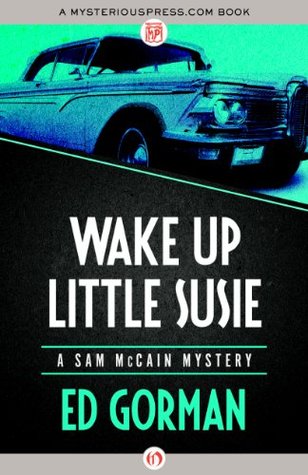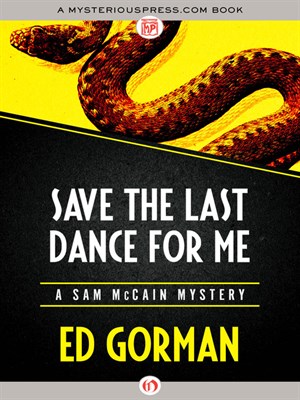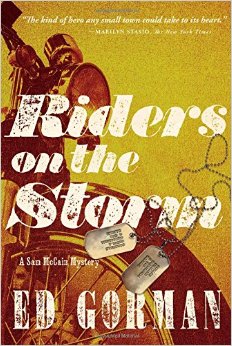 A small-town hero with a big heart, Sam McCain is living through tumultuous times in Ed Gorman’s distinguished series of novels set in America’s Midwest from the late 1950s to the early 1970s.
A small-town hero with a big heart, Sam McCain is living through tumultuous times in Ed Gorman’s distinguished series of novels set in America’s Midwest from the late 1950s to the early 1970s.
Sam McCain—the fictional private investigator/ lawyer in Black River Falls, Iowa (population 26,760, “four and a half hours away from Chicago”), whose realistic and engaging life and career are being chronicled by Iowa author Ed Gorman in an ongoing series of novels spanning (so far) from the late 1950s through the early 1970s—is not your father’s predictable, toughtalking, hard-living private eye.
Diminutive in stature (he’s 5’5”), still baby-faced at 23, Sam’s standard attire is a white button-down shirt, chinos, and desert boots. He drives a ’51 red Ford convertible with a woven-cloth ragtop, smokes Lucky cigarettes, drinks Falstaff beer, and jots down case info in Captain Video notebooks bought at a discount. His office is a single room on the side of the local dime-store. The “youngest and poorest” attorney in town (“My clients were mostly one step above public defender level”), Sam needs private eye work to pay the rent; and his main client is Judge Esme Anne Whitney, a Katharine Hepburn act-alike who yearns for the vanished days when her ancestors ruled the town; Her Honor has a running feud with the current civic powers that be (including the boorish, bullying chief of police), and also takes childish delight in shooting McCain with rubberbands from a dozen paces.
 Sam is a college grad, literate (he drops authors’ names from Baudelaire to Sinclair Lewis without missing a comma), competent, and may have a brighter future. But in the meantime, he lingers in Black River Falls (“For all its flaws, I love the place,” he insists), trying to emulate the actor Robert Ryan (“I really like that crazed Irish intensity of his”), carrying a torch for his gradeschool sweetheart Pamela (who carries a torch for someone else), and daydreaming: “I wished I could paint. Or be a serious pianist. … Or be a great novelist. … Or figure out a way to get Pamela to marry me.”
Sam is a college grad, literate (he drops authors’ names from Baudelaire to Sinclair Lewis without missing a comma), competent, and may have a brighter future. But in the meantime, he lingers in Black River Falls (“For all its flaws, I love the place,” he insists), trying to emulate the actor Robert Ryan (“I really like that crazed Irish intensity of his”), carrying a torch for his gradeschool sweetheart Pamela (who carries a torch for someone else), and daydreaming: “I wished I could paint. Or be a serious pianist. … Or be a great novelist. … Or figure out a way to get Pamela to marry me.”
Readers who like to consume series books in chronological order have the unusual option with the McCain novels of starting with the saga’s first-published book The Day the Music Died (1999), which takes place in 1959 at the time of the plane crash that took the life of Buddy Holly (McCain’s so shook up he gets the date wrong); or the next-published installment, Wake Up Little Susie (2000), which takes place five months earlier in historical time, when Ford Motor Company’s latest “innovative” automobile debuted in the fall of 1958.
Nothing’s lost by commencing with Wake Up Little Susie, in which the corpse that propels the action turns up early on page 19: It’s the ex-district attorney’s wife, stuffed into the trunk of a factory-fresh peach-and-kiwi colored Edsel. Was she killed by her husband, a political hopeful with a not-so-secret penchant for spouse abuse? Or might his jealous ex-wife be the guilty party? Or how about that tight-lipped ex-con living on the edge of town?
Sam makes his way through a case in intuitive fits and starts, sharing speculation and insights with his down-to-earth Midwestern neighbors (such as his chic landlady, who reminds him of Lauren Bacall), and fending off insults and beatings from foes (principally the aforementioned chief of police). It’s McCain’s sweet gift to feel empathy for almost everyone, yet he isn’t oblivious to the dark side of a place where everyone knows everyone else and their business.
“In a small town, you get punished for being different in any way, and sometimes when you sit in a small-town barbershop you get a sense of what Salem must have been like during the witch trials. Reputations get smeared, sometimes ruined permanently. Women get ripped up especially hard. … The modern version of the lynch mob: They hang you with innuendo and lies.”
 Sam’s acquaintance with works by such authors as Balzac and Ibsen gives him necessary perspective on human nature: “I guess that’s the understanding I get from reading. That all people are the same. No matter how far back in history you go.”
Sam’s acquaintance with works by such authors as Balzac and Ibsen gives him necessary perspective on human nature: “I guess that’s the understanding I get from reading. That all people are the same. No matter how far back in history you go.”
Sam and his people are of humble stock: They’re from the town’s poorest section, the Knolls. By dint of hard work and good luck, McCain and his folks (with whom he’s still close) made it out of that social ghetto, but “The Knolls and its despair and its violence had taught…too many of us, things we shouldn’t have known at such tender ages. Things that marked us forever.” McCain, forever aware of economic and political disparities, is always the underdog’s champion. He’s a Democrat, through and through. Yet, later in life, he’s forced to concede: “I’ve learned to my dismay that there are a lot of downright decent wealthy people. Not fair at all.”
The McCain series—ten books so far, each titled with a pop song from its particular time frame—has an obvious nostalgic appeal, but it’s also focused in a street-level way on tough issues of not so long ago.
Racial prejudice and illegal abortions are encountered in The Day the Music Died. The 1962 Cuban missile crisis and the threat of nuclear war weave through Breaking Up Is Hard to Do (2004), in which a corpse is discovered in a fallout shelter. By ’63, civil rights activists are working in the South; while in Sam’s town, a black college student rumored to have been having an affair with a white Senator’s daughter is killed.
In 1964, the Beatles and their colleagues have given young people a Ticket to Ride (2009), but an evangelical minister has joined forces with the police to crack down on longhairs—while Black River Falls suffers its first casualties of the war in Vietnam.
A hippie commune has come to town by the time of Bad Moon Rising (2001), testing the tolerance of many and bringing out the worst in a violent few, even as Nixon helms the Vietnam War after LBJ’s “abdication.”
 In the latest McCain entry, the just-released Riders on the Storm (October 2014, Pegasus Books), it’s 1971. Not only is Black River Falls coming apart at its political seams, McCain himself—veteran of a near-fatal accident that put a premature end to his attempted Army service—is suffering psychological and physical stress. He’s in better shape though than a fellow returnee scorned and beaten for joining an antiwar veterans group—and then accused of murdering his principal hometown tormentor.
In the latest McCain entry, the just-released Riders on the Storm (October 2014, Pegasus Books), it’s 1971. Not only is Black River Falls coming apart at its political seams, McCain himself—veteran of a near-fatal accident that put a premature end to his attempted Army service—is suffering psychological and physical stress. He’s in better shape though than a fellow returnee scorned and beaten for joining an antiwar veterans group—and then accused of murdering his principal hometown tormentor.
“The war was not only destroying people overseas,” Sam says, “it was destroying them back in my hometown.”
The population of Black River Falls has grown by now to 35,000 or so. Many folks still keep their doors unlocked—but that’s changing. McCain, back at work, still, as a lawyer and private investigator, now has his one-room office at the rear of a one-story laundromat building. He drinks Hamms beer, not Falstaff—and also hits the harder stuff: “I’d taken to getting sloppy drunk sometimes. …I was confused and…the meds weren’t tempering my anger or my depression. …I felt out of place just about everywhere since coming back home.”
The good news is that Sam’s old nemesis, the trigger-happy police chief, has at last retired. The bad news is that his replacement, a seemingly friendlier and more civilized type, is quick to pin the new murder rap on McCain’s lifelong friend. The more things seem to change, the more they apparently stay the same.
Ed Gorman’s Sam McCain series seems almost unique in its soft-spoken achievement: being at once a satisfying batch of mysteries, a history of social attitudes in a Midwestern town over a tumultuous period, and a running biography of its likable but increasingly put-upon narrator-protagonist. The series’ first several books are compulsively readable. By the time of Riders on the Storm, though, the tone and mood are bleak beyond melancholy: reflective of a narrator unsure of where he and his world are headed, but clinging nonetheless to the heartland values and behavior—friendship, decency, loyalty, courage, reason, redemptive love—that have made him appealing from the first and that have been reinforced in him by over a dozen years of mixed experience.
And then one realizes the melancholy has been there all along, a defining aspect of McCain’s personality, laced though with the semi-saving grace of humor (sometimes ironic, sometimes self-deprecating). “Jack Kerouac said that even at a very young age he’d had this great oppressive sense of loss,” McCain recalled back in The Day the Music Died, “of something good and true vanished, something he could never articulate, something he had carried around with him as young as age eight or nine.…I guess I had it too, this melancholy…. Maybe it’s just all the sadness I see in the people around me, just below the surface I mean, and the fact that there’s nothing I can do about it. Life is like that sometimes.”
Young or old, rich or not, male or female, single or married: Some of people’s larger mysteries, McCain has learned in each installment of this distinguished series, are never solved. Life is like that sometimes.
SAM MCCAIN MYSTERIES
The Day the Music Died (1999)
Will You Still Love Me Tomorrow (2000)
Wake Up Little Susie (2001)
Save the Last Dance for Me (2002)
Everybody’s Somebody’s Fool (2004)
Breaking Up Is Hard To Do (2004)
Fools Rush In (2007)
Ticket to Ride (2009)
Bad Moon Rising (2011)
Riders on the Storm (2014)
First published in Mystery Scene Fall #136 2014.
Tom Nolan reviews mystery fiction for The Wall Street Journal.


